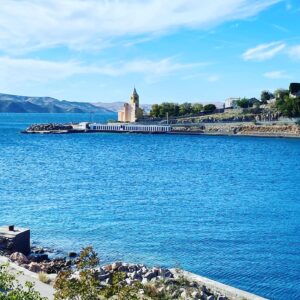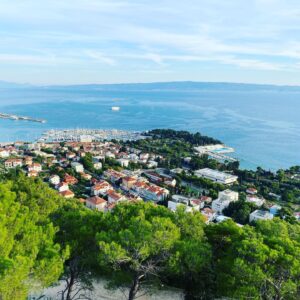
It has been a while since we’ve reached out to the Ministry of Finance in Croatia to clear out some unanswered questions regarding the taxes that remote workers who have been granted the Temporary Stay of Digital Nomads have to pay. Today, we finally got some answers straight from the source!
We are eager to share them with you below, plus you can check the updated info on the Digital Nomad Visas pages: CROATIA Temporary Stay of Digital Nomads.
Local Taxes
Digital nomads who have been approved for the Temporary Stay are not required to pay local income taxes on the income from their remote job. Nor do they have to do any local fillings for any income that they derive from that remote job.
No income tax from the remote job for up to a year.
Tax Residency
Worth noting is that during the process Digital Nomad will be given a tax number, however that doesn’t indicate that they become tax residents of Croatia. On the contrary, as a default, they are considered non-tax-residents.
As non-tax-resident, Nomads won’t have to pay tax on any of the passive income that they have that is derived from capital or property outside of Croatia.
Spending over 183 days in Croatia doesn’t mean necessarily that a Nomad becomes a Croatian tax resident. In order to verify that, the whole procedure of determining tax residency needs to be carried out.
See the Nitty-gritty section for more details but in short, if you have strong connections with your home country and if they still consider you a tax resident, you will be classified as a non-tax-resident in Croatia. If you currently don’t have tax residency, most likely, you will be considered a tax resident in Croatia.
If a Nomad is deemed to be a Croatian tax resident, they still don’t need to pay income tax on the income from the remote work they declared when getting the Digital Nomad status. However, they will need to pay tax on all of their other incomes worldwide.
No local tax residency if you have tax residency back home
Taxes Back Home
Holders of the Digital Nomad Temporary Stay are not allowed to work for nor to derive any income from any local entity and are expected to pay their taxes in the countries in which they are normally residents.
It’s unclear if nomads who technically don’t currently have tax residency are subject to the same treatment as above or not. We’ve reached out to the Ministry of Finance for comments on that.
Employer Perspective
Employers of remote workers are not required to register or have a payroll in Croatia, however, it is unclear if they would need to pay any other contributions or if an employee presence there creates the permanent establishment and other issues.
There is also no need to pay any social contributions if the only activity is the remote work for which the Nomad has been approved.
No local registration, payroll, or filing for foreign employer of an approved Digital Nomad
Pros & Cons
Let’s start with quick list of the Pros & Cons of the Digital Nomad Stay from the process & tax perspective.
For more details please see theCROATIA Temporary Stay of Digital Nomads.
How does it compare?
What is great is that the tax situation is quite clearly defined in the tax laws. Be it the Article 9 or 3 of the Income Tax Act or the General Tax Act. There is no confusion about it and the information provided by the Ministry of Finance is quite clear on various tax related issues.
This is surprisingly unusual as we see way too many remote work visas that mentioned taxes very briefly but don’t regulate the details and various user cases.
In case of Croatia, similarly to Estonia, if you have tax residency somewhere else there should be no grounds for considering you a tax resident and your permanent residence is back home. On occasion the standard procedure of determining tax residency in Croatia will have to be carried out. And if you have no tax residency anywhere else, you will be considered a tax resident in both Croatia or Estonia.
The difference is that in Estonia you can benefit from not paying the income tax only for max 6 months, you will also be required to do local filings even if you are not a resident. Considering all the details, it is also most likely that you would be considered a tax resident in Estonia rather than Croatia due to stricter tax residency laws.

The nitty-gritty
A bit more details and jargon straight from Ministry of Finance and the Tax Administration & the Ministry of Interior. You can find some of their responses below.

- Processing Time – When a third-country national submits an application for temporary stay in line with the Aliens Act, and in cases when an official is deciding directly upon the application, he is obligated to issue a decision at the latest within 30 days following the receipt of the application in the correct form. In cases of an inquiry procedure, an official is obligated to issue a decision at the latest within 60 days following the receipt of the application in the correct form. The average time it takes to decide upon an application is 20 days following the receipt of an application in the correct form.
- Who Can Apply – Pursuant to the Aliens Act, third-country nationals in Croatia who are employed or perform work through communication technology for a company or their own company that is not registered in the Republic of Croatia and who do not perform work or provide services to employers in the territory of the Republic of Croatia, can regulate their temporary stay as digital nomads.

- Digital Nomads Income Tax – In accordance with Article 9, paragraph 1, item 26 of the Income Tax Act (Official Gazette, nos. 115/16, 106/18, 121/19, 32/20 and 138/20; hereinafter: the Act) income tax is not to be paid on receipts of natural persons generated on the basis of employment or activity for an employer not registered in the Republic of Croatia on the basis of gaining the status of digital nomad under special regulation. Accordingly, income tax is not to be paid on receipts of natural persons generated on the basis of employment or activity.
- Furthermore, natural person with the status of digital nomad who is not a Croatian resident is not obliged to file income tax return and to pay income tax in Croatia on the basis of passive income (income from capital and/or property) if such income is not gained in Croatia. In other words, all income gained in Croatia, which is not income gained from employment or activity for an employer registered outside of the Republic of Croatia, is taxable in Croatia, where it is important to take account of whether there is an applicable DTA with the country of residence of the digital nomad.

- Residency & Tax Residency in Croatia – In accordance with Article 3 of the Income Tax Act, a resident is a natural person with permanent residence or habitual residence in the Republic of Croatia. Permanent and habitual residence for tax purposes is governed by the provisions of Article 43 of the General Tax Act, according to which: the taxpayer holds permanent residence at the place where they own or are in the possession of a property continuously for at least 183 days in one or two calendar years. Residing in the property is not obligatory;
- If the taxpayer owns or is in the possession of several properties in the Republic of Croatia, the place of permanent residence relevant for taxation is determined according to the permanent residence of the family, and for an unmarried taxpayer, according to the place in which they spend most of their time or according to the place from which they most commonly leave for work or conducting business;
- If the taxpayer holds permanent residence both in the country and abroad, it is considered that they hold permanent residence in the country of permanent residence of their family, and in the case of unmarried taxpayers or if a permanent residence of the family cannot be established, it is considered that they hold permanent residence in the country where they predominantly go to work or perform a business activity or predominantly reside. In case that the other country does not regard the taxpayer as its resident, is it considered that such taxpayer has a residence in the national territory.
- Traveling in & out of Croatia – Pursuant to the Aliens Act, a temporary stay permit will be withdrawn if the third-country national is absent from Croatia for more than 90 days in total on multiple occasions, or for more than 30 days on a single occasion during his temporary stay that has been granted for up to one year and for any of the possible purposes (including for the stay of digital nomads). Third-country nationals who are granted temporary stay in Croatia are allowed to travel. However, during the 12-month period of their temporary stay, they cannot be absent from Croatia for more than 90 days.

Footnotes

At Global Nomad Guide, we take our role seriously and put a lot of effort into assuring that all the information about Remote Work Visas is reliable and accurate. Read about how we verify the digital nomad Visas info.
Disclaimers
Please note that even though we do our very best to verify all the content, Global Nomad Guide is here to give you an overview of what’s available. The information we provide should not be considered as a legal opinion, tax, or financial advice. You should always seek expert advice. If you want to receive a legal opinion or tax advice please contact us and we will refer you to a legal practitioner.
Feedback
Also, we are only humans so if you see that anything is missing or if there is a new visa that we haven’t covered yet? Let us know and we will add it in ASAP!
If you belong to a tourist organization, or other governmental body responsible for your country’s Remote Work Program, and would like to have it featured on the Global Nomad Guide, please reach out to us via chat or contact form.
Last updated October 6, 2022.
REVIEW
FAVOURITES
SHARE
NEWSLETTER
No Spam, Just Updates!
FOLLOW US
DIGITAL NOMAD VISAS

















